- Home
- Amelia C. Adams
Bribing the Blacksmith Page 2
Bribing the Blacksmith Read online
Page 2
As soon as the marshal walked away, Mariah looked up and saw Mrs. Gladstone scurrying toward her. “My dear, whatever is the matter?” she asked when she drew near. “I was nearly home when I realized I left my parasol on the train, and here you still are, and I thought for sure you would have been carried off by your handsome groom by now.”
Mariah pulled in a ragged breath. “Mrs. Gladstone, have you ever met a man named Lester Coyle?”
“No, but there are a great many people around just now that I’ve never met. We’re a growing community, and I can’t possibly keep track of everyone.” She paused. “What are you saying, dear?”
“The marshal says no one by that name even lives in Creede.”
Mrs. Gladstone’s hand flew to her throat. “Are you saying . . . my dear, are you all alone and abandoned?”
“It . . . it looks that way.” Mariah tried for a brave smile.
“Well, that won’t do at all. I’m taking you home with me, and I’ll coddle you and set you to rights. Then you can decide what to do from here on out.”
Mariah almost refused, thinking that this Mrs. Jameson person the marshal had gone to find was the better choice, but Mrs. Gladstone’s compassionate tone of voice convinced her. “Are you sure I won’t be a bother?”
“Of course you won’t be a bother! My house is much too large for just me, and I’d be delighted of the company. Now, come along and let’s get you settled.”
Mariah gathered up the handles of her satchels and followed Mrs. Gladstone away from the station. When they passed the marshal, who was walking toward them, she said, “Thank you so much, but I’ve found my own place to be.” She nodded toward Mrs. Gladstone to indicate where she was going, and then she was on her way to find some sort of peace and solace on a day that had definitely not gone as she had hoped or planned.
Chapter Two
Hans Jensen wiped his forearm on his sleeve, trying to buy a little time before he had to reply to the imperious-looking woman standing in front of him. She was the absolute picture of a stern schoolmarm, with pinched lips and a tight bun and a highly disapproving look on her face.
“I’m sorry,” he said, “but I don’t understand.”
She sighed as though repeating herself would be the most horrible thing that had ever happened to her. “My name is Matilda Patterson, and I’ve brought you your two nephews. Honestly, Mr. Jensen, I don’t know why that’s such a difficult concept.”
“I didn’t even know they were coming,” Hans tried to explain. “We didn’t have a visit scheduled—I’ve never even met them, actually.”
Miss Patterson blinked a few times. “Do you mean to tell me that you don’t know?”
“Don’t know what?”
She turned and glanced over her shoulder. He could see two small boys waiting outside his smithy, obviously trying to behave themselves, but just as obviously fighting the wiggles. “Mr. Jensen, I thought you’d been informed. I apologize for bringing you the news in this way, but your sister and brother-in-law were killed last week.”
Hans felt a wave of nausea pass over him, and he closed his eyes against it. “Killed?” he said after he’d swallowed a few times. “What do you mean?”
“Their carriage slipped off the side of a steep embankment,” she told him. “The boys were visiting a friend and weren’t with them at the time, thank goodness.”
Hans nodded absently. “Beatrice Jameson’s parents were killed much the same way,” he murmured. Not that the coincidence meant anything. It was just the first thing that came to his mind.
Miss Patterson raised an eyebrow. “Sir, these two little boys are now orphans, and you’re their only living relative. They were taken to the local children’s home until you could be located, and well, here you are, and now they’re here too. They each have one suitcase—I asked the stationmaster to hold those for you because we weren’t capable of lugging them all that distance from the station. I need to be on my way—I’m taking the next train back out of town. Good day, sir, and good luck.”
She turned to go, but Hans called to her. “Please, wait.”
She looked at him expectantly. “Yes?”
“I . . .” He shook his head. He’d been brought two little boys? He was expected to raise them? This wasn’t possible. And his sister couldn’t be dead. He pinched his nose bridge, trying to ease the headache behind his eyes. “I don’t know how to take care of children.”
“I’m sure you’ll figure it out.” She paused. “I’m not entirely without feeling, Mr. Jensen. I know this is a shock. But I know you’ll find a way.” With that, she was gone, giving a nod to the boys as she passed them.
Hans pulled in a deep breath. How was this happening? He thought back to the last time he’d seen his sister. It was her wedding, and she’d been so happy. He remembered the little flowers she’d woven throughout her hair, the smile on her face, the way she’d radiated joy as she looked at her new husband. Then they’d moved to Denver and Hans had come to Creede, and for some reason, they hadn’t made the effort to see each other since. Why hadn’t they? It wasn’t such a terribly long distance. He could have closed the forge for a couple of days—why had he thought work was so important?
Now he’d never see her again because he hadn’t made his family a priority.
He closed his eyes, fighting another wave of nausea. When he opened them, he saw two little faces peeking in through the doorway, both with eyes as big and bright as stars.
“Are you our uncle?” the bigger boy asked. He looked so much like his mother, Hans had to look twice to make sure it wasn’t actually her coming back as a small child to visit him.
“I am,” Hans managed to say. His voice sounded strangled. No wonder, with the lump in his throat. He swallowed a few times. “I’m Uncle Hans.” Better, although still weak.
The boys entered the forge slowly, as though they were afraid to be there. Hans imagined that the fire did look rather intimidating. “It’s all right,” he said. “The fire can’t hurt you unless you touch it, but you’re both old enough to stay away from it, aren’t you?”
They nodded, making a wide arc around the fire as they approached him.
“Well, now.” Hans looked them over. “I believe I know your names. You must be Peter, and you must be Preston.”
Peter’s eyes grew even wider. “How did you know?” he exclaimed.
Hans laughed. “Your mother wrote me letters. She told me what fine boys she had—how much I would like you.” He cleared his throat. “She loved you very much.”
Peter looked down at the floor and scuffed his feet. “She made us cookies and read us stories,” he said, his voice so low, Hans almost couldn’t hear it.
“That’s definitely what a mother does when she loves her boys.” Hans felt the weight of this new responsibility pressing in on him. He was stunned by the news of his sister’s death, but he had to be strong for these children who had lost both a mother and a father. Of course he was sorry to hear about his brother-in-law, but in truth, he’d barely known the man. His sister, on the other hand, had been very dear to him. How he wished he’d written her more often—she’d been very faithful in that way, and he hadn’t reciprocated.
Now he had a chance to make up for that—he’d do right by her boys. He just didn’t have any idea at all how to begin. “Are you hungry?”
Both boys nodded.
Hans didn’t have a single thing to eat in his house. He’d planned to go over to the mercantile that afternoon and pick up some tinned things, but the boys were hungry now, not later. Food . . . food . . .
He pulled off his heavy apron, hung it on a hook, and ushered the boys back outside. Then he pulled the doors of the forge closed and locked them. There were certain safety procedures he had to follow if he was to keep curious fingers safe from his operations. “Let’s go see what we can find to eat.”
***
Fifteen minutes later, he and the two boys were seated across from each other at Toria Jackson�
��s kitchen table. The mercantile owner’s new wife had taken it upon herself to serve up meals to the hungry miners for a small fee, and while Hans hadn’t signed up in advance like he was supposed to, and while it wasn’t mealtime, she’d taken one look at the little boys and insisted that they march right upstairs and sit down.
“I won’t have hungry children on my conscience,” she’d told Hans when he protested. “I don’t care that it’s not an official mealtime—I’ll find you something hot and filling. Just give me a few minutes.”
True to her word, she’d found some beef stew in her icebox and warmed it up for them, serving it alongside some fresh, fluffy bread and glasses of frothy milk. The boys dug in like they hadn’t eaten in decades, and Hans was nearly as eager. He was tired of his lousy attempts at cooking—maybe he should be eating over here every day.
Toria stood there, her hands on her hips, looking the boys over. “Mr. Jensen, do you have what you need to care for these children?”
Hans shook his head. “I don’t even know what I need to take care of them, honestly. This was all a big surprise.”
“A very delightful one, I’m sure, even though the reasons for it are painful.” Her eyes flicked back and forth between the boys, and a tender smile crossed her lips. “When you’re done eating, we’ll head downstairs and gather you up some supplies. I’d be more than happy to point you in the right direction.”
“Thank you, ma’am. I’d be grateful for whatever help you could give me,” Hans said. She was making it sound like children needed a whole slew of strange stuff—was this going to be so very complicated? For that matter, where would they sleep—he only had one bed, although he had a spare room. He’d never felt the need to furnish his home much—he never had guests. He pressed his fingers to his nose bridge again. He needed to calm down, to take this one step at a time. After they ate, they’d get the boys’ things from the train station, and they’d decide where to put everything. Then he’d worry about a bed and blankets and . . . and . . . he didn’t even know what came next on that list of worries.
“This must be so difficult for you,” Toria said kindly. “Please let us help you however we can. I know the ladies in town would love to contribute.”
“I couldn’t possibly ask,” Hans began.
“And that’s why you’re not asking,” she replied. “I’m explaining how we’re going to voluntarily help you. There’s a difference, you know.”
He nodded. He couldn’t afford to be prideful—these little boys needed him, and he wasn’t prepared in any way to take them in. He’d need all the help he could get.
When he and his nephews had eaten their fill, Toria handed him a basket. “Here’s tonight’s supper,” she said. “Now, let’s head down to the store and see what else you might need.”
Hans moved along the aisles in a daze, barely listening as Toria chattered. “You’ll definitely need some tinned peaches—boys love peaches. Don’t they?” His nephews nodded. “Oh, and flour, sugar, baking powder . . .” She stopped suddenly, and Hans nearly ran into her. “Do you know how to cook?”
“Um, not really,” he mumbled. “I do a lot of tinned food.”
“Oh. Well, that does change things a bit. I’ll talk to Beatrice . . .”
Hans wasn’t sure if she was still talking to him or to herself, so he just kept following her, and by the time she was done, the counter was piled high. He didn’t have much money—how was he supposed to pay for it?
“Now, listen,” she said, turning to face him at last. “You’re not to worry about this.” She waved her hand at the things she’d chosen out for him. “I’m going to put this all on an account for you, and I’m willing to bet that when word spreads about these little cuties, the people of Creede will want to help in any way they can, and they’ll make donations.”
Hans nearly choked. “I couldn’t possibly—”
“That’s how the good people of this town are,” Toria said. “We’re not entirely made up of cattle rustlers and outlaws, you know.”
“I know, but—”
“Mr. Jensen, are you going to trust me to help you with this or not? You’re a man in a desperate situation. I’m a shopkeeper with means at her disposal to help you out. It would be utterly foolish of you not to accept what I’m offering. A single man with only himself to care for can be foolish once in a while, but when there are children involved, it becomes an entirely different matter.”
Hans nodded. He’d just been lecturing himself about his pride—he obviously hadn’t listened well enough. “Thank you, Mrs. Jackson. I’ll take it and be grateful for it.”
She gave him a bright smile. “That’s more like it. Oh, and we forgot a few things.” She turned and grabbed a loaf of bread and a pie from the display of fresh-baked goods, then reached behind the glass display case and brought out two wooden toy ponies. “The boys need a welcome present,” she said, her voice going soft. “These are on the house.”
Hans bit back his protest. “Thank you,” he replied instead. She flashed him another smile as though understanding how very difficult that had been for him.
“You take the dinner basket, the toys, and the baked goods home with you now, and I’ll send John over with the rest of this later,” she said. “And I imagine you’ll want to prepare yourself for a string of visitors throughout the afternoon.”
Hans ran his fingers through his hair. “All right. How can I ever thank you, Mrs. Jackson?”
She shook her head. “You’re not even to think about that. Go home and get those young men settled.” She nodded to where the boys were waiting by the front door, looking impatient, but standing still. They’d obviously been trained in good manners.
“All right. Are you ready, boys?”
“Yes!” Peter said enthusiastically, and Preston nodded.
“Then let’s be off.” Hans gathered up the basket and the other box Toria had prepared for him, and the threesome walked back up the street. His mind was an absolute whirlwind, and it didn’t seem that he was to get a moment’s peace to sort things out.
Chapter Three
Mariah hadn’t brought much with her, so it hadn’t taken her long to unpack in Mrs. Gladstone’s pretty spare room. The walls were papered with forget-me-nots, and the furniture was richly varnished wood that felt like silk under her fingers. She could find herself very comfortable here and was grateful to have a safe place to stay, but she couldn’t shove aside her feelings of humiliation at being tricked, and the terror of being grabbed on the platform. Thank goodness Marshal Wheeler had come along when he had.
She went downstairs and had some hot tea with Mrs. Gladstone, then stood up and walked over to the window, peering out toward Main Street. “Is there a telegraph office in town? I should let my mother know I arrived safely. Well, mostly safely.”
Mrs. Gladstone chuckled. “I’m sure she’ll be glad to hear it. Are you going to tell her everything?”
“No, not just yet. I’ll give her a few weeks before I fill her in on the less-savory details. If you’ll point me in the right direction, I’ll go do that now.”
A few moments later, Mariah stepped outside and pulled the front door closed behind her. The telegraph office was located in the same building as the home where the operator lived—that was rather convenient. She found it easily enough and went inside, finding a kind-looking man sitting behind a desk.
“Hello,” she said. “I’d like to send a telegram, please.”
“You’ve certainly come to the right place for it, Miss . . .”
“Redding. Mariah Redding.”
“It’s a pleasure to meet you. I’m Arthur Jameson, and my wife is Beatrice. Are you new in town?”
That was such a hard question to answer now that everything had been tossed on its head. “To be honest, I don’t know. Is there work available here?”
“There’s certainly a lot of opportunity for it, but as I’m sure you noticed, we’re a town in the midst of rebuilding. A fire came through here not
long ago, and not our first, either. We seem to be rather prone to fires.” He chuckled. “If I were you, I’d ask around a bit and see who might know of some work. What we need mostly are carpenters and other hard laborers until things are rebuilt.”
“I’m afraid I fit in neither category,” Mariah said with a chuckle. “I’ll do some asking around, though, and see what I might discover.”
“And I’ll let you know if I hear of anything.” Mr. Jameson picked up a pencil. “Now, what would you like your telegram to say?”
That was another hard question. She wanted to assure her mother that she was all right, but she didn’t want to give too many details until things were more settled. “How about, ‘Arrived in Creede. All is well. Will write soon.’”
Mr. Jameson jotted that down. “Is that everything?”
“I believe so. For now. And I will write her soon—I’m not just saying that.”
He chuckled. “I believe you. Where am I sending this?”
Once she’d given him all the information he needed and paid him, she stepped back outside, looking up and down the street. Now that he’d pointed it out, yes, she could see damage to some of the buildings, but she could also see that many places looked bright and new and freshly painted. They were sure to need employees now that they were ready for business again.
The most logical thing was to head for the mercantile. One could always count on hearing the latest news at the local shops, and she could rest assured that any available jobs would be known about at the mercantile.
When she entered, she immediately picked up on the scent of bread. She loved that smell more than almost anything in the world.

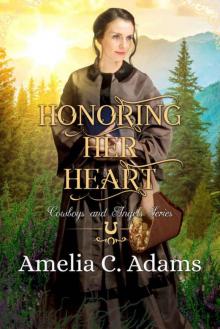 Honoring Her Heart
Honoring Her Heart Buttons and Bows
Buttons and Bows An Agent for Emily
An Agent for Emily Christmas Catch-Up VIII (River's End Ranch)
Christmas Catch-Up VIII (River's End Ranch) A Rancher for Rowena
A Rancher for Rowena Candice (Seven Sisters Book 6)
Candice (Seven Sisters Book 6) Butterfly Kisses
Butterfly Kisses A Stitch in Time
A Stitch in Time Buttons and Bows (The Sewing Circle Book 3)
Buttons and Bows (The Sewing Circle Book 3) Sidearms and Songbirds (Hearts of Nashville Book 3)
Sidearms and Songbirds (Hearts of Nashville Book 3) Herd to Breathe
Herd to Breathe The Ties That Bind
The Ties That Bind Rhyme or Reason
Rhyme or Reason Revelations (Brody Hotel Book 4)
Revelations (Brody Hotel Book 4) Phoebe's Fate (Burnt River Contemporary Western Romance Book 9)
Phoebe's Fate (Burnt River Contemporary Western Romance Book 9) And Something Blue (Main Street Merchants Book 1)
And Something Blue (Main Street Merchants Book 1)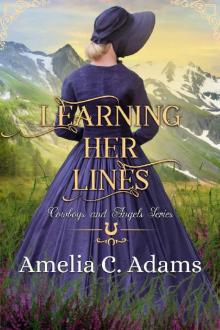 Learning Her Lines
Learning Her Lines Connections
Connections The Turn of a Wheel (Kansas Crossroads Book 17)
The Turn of a Wheel (Kansas Crossroads Book 17) Just Desserts (Main Street Merchants Book 4)
Just Desserts (Main Street Merchants Book 4) An Agent for Anna
An Agent for Anna An Agent for Esme
An Agent for Esme A Handyman for Helen
A Handyman for Helen Scented Sensibility
Scented Sensibility Addie's Adventurer
Addie's Adventurer Defying the Darkness
Defying the Darkness Riding the Rails
Riding the Rails Sugar And Spice (Main Street Merchants Book 7)
Sugar And Spice (Main Street Merchants Book 7) An Agent for Cynthia
An Agent for Cynthia In The Stars (Main Street Merchants Book 6)
In The Stars (Main Street Merchants Book 6) Moonlight With Alice (The Matchmaker's Ball Book 3)
Moonlight With Alice (The Matchmaker's Ball Book 3) Five Golden Rings (Main Street Merchants Book 3)
Five Golden Rings (Main Street Merchants Book 3) Between The Lines (Main Street Merchants Book 5)
Between The Lines (Main Street Merchants Book 5) An Agent for Lucy
An Agent for Lucy Jessica (Seven Sisters Book 2)
Jessica (Seven Sisters Book 2) A Passing Glance
A Passing Glance Pet Peeves
Pet Peeves RNWMP: Bride for Joel
RNWMP: Bride for Joel Bowing to Betsy (The Matchmaker's Ball Book 11)
Bowing to Betsy (The Matchmaker's Ball Book 11) Rebekah (Seven Sisters Book 4)
Rebekah (Seven Sisters Book 4) A Joyful Noise (Kansas Crossroads Book 14)
A Joyful Noise (Kansas Crossroads Book 14) Her Second Chance Hometown Groom
Her Second Chance Hometown Groom A Christmas Promise (Kansas Crossroads Book 16)
A Christmas Promise (Kansas Crossroads Book 16) Bride for Samuel
Bride for Samuel Bribing the Blacksmith (Cowboys and Angels Book 9)
Bribing the Blacksmith (Cowboys and Angels Book 9) RNWMP: Bride for Samuel (Mail Order Mounties Book 12)
RNWMP: Bride for Samuel (Mail Order Mounties Book 12) Tea for Two
Tea for Two The Bitter and the Sweet (Kansas Crossroads Book 9)
The Bitter and the Sweet (Kansas Crossroads Book 9) Frank (Seven Sons Book 6)
Frank (Seven Sons Book 6) A Cattleman for Cora
A Cattleman for Cora Paislee's Path (River's End Ranch Book 48)
Paislee's Path (River's End Ranch Book 48) Accidental Agent (River's End Ranch Book 3)
Accidental Agent (River's End Ranch Book 3)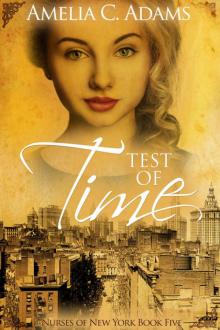 Test of Time (Nurses of New York Book 5)
Test of Time (Nurses of New York Book 5) RNWMP: Bride for Michael (Mail Order Mounties Book 24)
RNWMP: Bride for Michael (Mail Order Mounties Book 24) Loving the Landlord
Loving the Landlord The Dark and the Dawn (Kansas Crossroads Book 3)
The Dark and the Dawn (Kansas Crossroads Book 3) Candy Crush
Candy Crush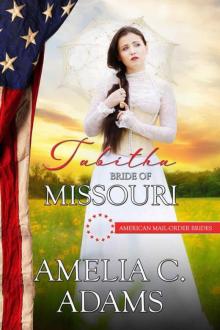 Tabitha: Bride of Missouri (American Mail-Order Bride 24)
Tabitha: Bride of Missouri (American Mail-Order Bride 24) Touch of Tenderness (Nurses of New York Book 3)
Touch of Tenderness (Nurses of New York Book 3) Lucky Lifeguard (River's End Ranch Book 28)
Lucky Lifeguard (River's End Ranch Book 28) Heartstrings (Brody Hotel Book 2)
Heartstrings (Brody Hotel Book 2) Heart of Hearts (Nurses of New York Book 4)
Heart of Hearts (Nurses of New York Book 4) Hope_Bride of New Jersey
Hope_Bride of New Jersey A Careless Wind (Kansas Crossroads Book 7)
A Careless Wind (Kansas Crossroads Book 7) An Agent for Emily (The Pinkerton Matchmaker Book 28)
An Agent for Emily (The Pinkerton Matchmaker Book 28) A Twisted Fate
A Twisted Fate Delivering Destiny (River's End Ranch Book 23)
Delivering Destiny (River's End Ranch Book 23)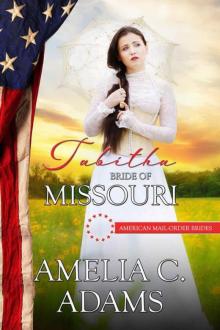 Tabitha_Bride of Missouri
Tabitha_Bride of Missouri A Wrangler for Wynonna
A Wrangler for Wynonna RNWMP_Bride for Peter
RNWMP_Bride for Peter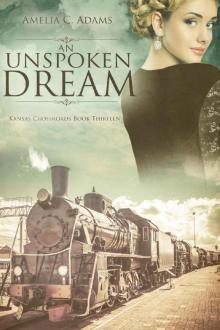 An Unspoken Dream (Kansas Crossroads Book 13)
An Unspoken Dream (Kansas Crossroads Book 13) Generations
Generations Utah Sunrise (Rocky Mountain Romances Book 1)
Utah Sunrise (Rocky Mountain Romances Book 1) Bride for Jonathan
Bride for Jonathan Bribing the Blacksmith
Bribing the Blacksmith A Clean Slate (Kansas Crossroads Book 4)
A Clean Slate (Kansas Crossroads Book 4) Hope: Bride of New Jersey (American Mail-Order Brides 3)
Hope: Bride of New Jersey (American Mail-Order Brides 3) Rugged Rockclimber (River's End Ranch Book 8)
Rugged Rockclimber (River's End Ranch Book 8) RNWMP_Bride for Michael
RNWMP_Bride for Michael RNWMP: Bride for Joel (Mail Order Mounties Book 4)
RNWMP: Bride for Joel (Mail Order Mounties Book 4) Tea For Two (Cowboys & Angels Book 15)
Tea For Two (Cowboys & Angels Book 15) Sweet Georgia Peach
Sweet Georgia Peach RNWMP: Bride for Peter (Mail Order Mounties Book 20)
RNWMP: Bride for Peter (Mail Order Mounties Book 20) A Clear Hope (Kansas Crossroads Book 5)
A Clear Hope (Kansas Crossroads Book 5) Meredith's Mistake (Grandma's Wedding Quilts Book 4)
Meredith's Mistake (Grandma's Wedding Quilts Book 4) RNWMP_Bride for Samuel
RNWMP_Bride for Samuel The Whisper of Morning (Kansas Crossroads Book 6)
The Whisper of Morning (Kansas Crossroads Book 6) RNWMP: Bride for Jonathan (Mail Order Mounties Book 8)
RNWMP: Bride for Jonathan (Mail Order Mounties Book 8) Santa's Shopkeeper (River's End Ranch Book 18)
Santa's Shopkeeper (River's End Ranch Book 18) A Broken Wing (Kansas Crossroads)
A Broken Wing (Kansas Crossroads)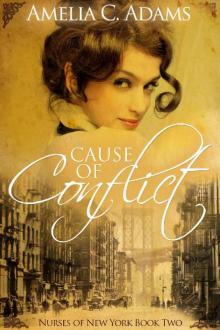 Cause of Conflict (Nurses of New York Book 2)
Cause of Conflict (Nurses of New York Book 2) A Free Heart
A Free Heart A New Beginning
A New Beginning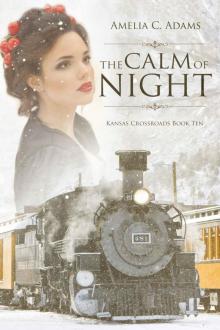 The Calm of Night (Kansas Crossroads Book 10)
The Calm of Night (Kansas Crossroads Book 10) Bride for Calvin
Bride for Calvin Sea of Strangers (Nurses of New York Book 1)
Sea of Strangers (Nurses of New York Book 1)